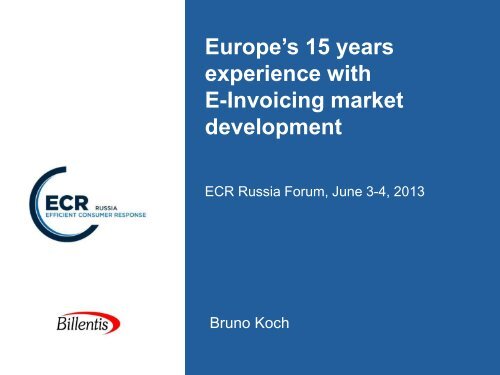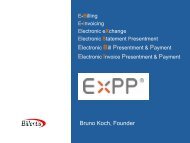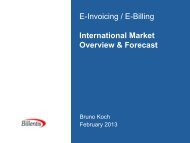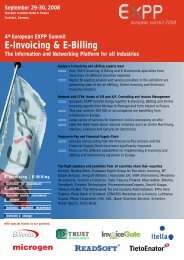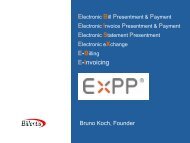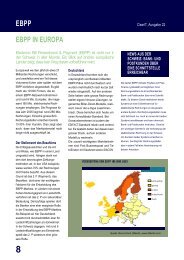Europe's 15 years experience with E-Invoicing market development ...
Europe's 15 years experience with E-Invoicing market development ...
Europe's 15 years experience with E-Invoicing market development ...
- No tags were found...
Create successful ePaper yourself
Turn your PDF publications into a flip-book with our unique Google optimized e-Paper software.
Europe’s <strong>15</strong> <strong>years</strong><strong>experience</strong> <strong>with</strong>E-<strong>Invoicing</strong> <strong>market</strong><strong>development</strong>ECR Russia Forum, June 3-4, 2013Bruno Koch
Development of E-<strong>Invoicing</strong> MarketPenetrationRecipientsegmentConsumerBusiness& GovernmentAnnual bill &invoice volumeestimated to be atleastEstimatedelectronicproportion oftotal volume in2013Estimated annualvolume increasein electronicbills/invoicesWorld Europe* World Europe* World Europe*200billion<strong>15</strong>0billion17 billion13%20%>5%20%16 billion 20% 29%* Here used in the narrow sense: Figures do not include the volume of Belarus, Ukraine, Turkey, Russia05.06.2013© Bruno Koch, Billentis - Reproduction is authorised provided the source is acknowledged.page 2
European E-<strong>Invoicing</strong> history in brief• The early days: Own <strong>experience</strong> in the nineties Promoters at that time: Retailers, GS1, Banks Challenge: No or insufficient legislation for B2B E-Invoices EDIFACT legally supported, but <strong>with</strong> paper based summaryinvoices in parallel• 2000-2005• <strong>Invoicing</strong> Directive (2001/1<strong>15</strong>/EC)• Required implementation into national legislations of EUmember states until 2004 at latest• EDIFACT <strong>with</strong> digitally signed single invoices or summaryinvoices• 2006-2010: Steady growth mainly driven by the private industry05/06/2013© Bruno Koch, Billentis - Reproduction is authorised provided the source is acknowledged. page 3
Development of European MarketElectronic share 2008 2009 2010 2011 2012 (E) 2013 (E)B2B/B2G/G2B 6% 8% 10% 13% 16% 20%• E-<strong>Invoicing</strong> volume is growing <strong>with</strong> an annual rate of almost 30%;roughly 50% exchanged directly among the trading partners, therest via 550+ E-<strong>Invoicing</strong> network operators• Sustainable growth rates expected until at least 2017• Meanwhile relatively mature <strong>market</strong>, also for millions of SMEs;they can just start <strong>with</strong>out asking for any permission of taxauthorities; they have not to report anything additional, except inSouthern and Eastern Europe05/06/2013© Bruno Koch, Billentis - Reproduction is authorised provided the source is acknowledged. page 4
Key stakeholders pushing the EuropeanE-<strong>Invoicing</strong> <strong>market</strong>• Large invoice issuers and recipients Issuers <strong>with</strong> advanced on-boarding methods, incentives andpenalties Recipients <strong>with</strong> the power play as large buyers• Solution and Service Providers• Market communicators• Regulators and tax authorities European Commission & national regulators push the digitalcollaboration between suppliers and buyers• Industries <strong>with</strong> high invoice volume Issuers: Telco, Utility, Card, Media, Logistics, Healthcare,Public Sector, Insurance Recipients: Retail, Healthcare, Public Sector05/06/2013© Bruno Koch, Billentis - Reproduction is authorised provided the source is acknowledged. page 5
Promote an E-Invoice standard?05/06/2013© Bruno Koch, Billentis - Reproduction is authorised provided the source is acknowledged. page 8
Evolution steps of public sectorPublic sector evolutionFrom the role as pure regulator towards an E-<strong>Invoicing</strong> userAutomate the full Supply Chain including e-ProcurementPressure on trading parties to make E-<strong>Invoicing</strong> obligatoryAll administrative units are enabled to process electronicinvoicesPart of own administration are enabled for the voluntaryuse of electronic invoicesOptimized rulesDefines strict rules mainly affecting users outside thepublic sector05/06/2013© Bruno Koch, Billentis - Reproduction is authorised provided the source is acknowledged. page 9
Public sector is responsible for <strong>15</strong>-18% of allpurchases made in a country.45-65% of all companies are suppliers for thepublic sector and send invoices to itsadministration.100% of all enterprises and householdsreceive invoices from the public sector.05/06/2013page 10
Some public sector objectives in EuropeSome projects <strong>with</strong> high ambitions for the public sector as E-<strong>Invoicing</strong> user• Austria (Invoices to the national administration have to be 100%electronically from 2014)• Belgium (objective: 50% invoices electronically in 20<strong>15</strong>)• Denmark (mandatory since 2005)• European Commission: Adoption of E-<strong>Invoicing</strong> in all 48 Directorate-Generals and Executive Agencies by January 2013• Finland is already close to 100% electronic invoices sent to the publicsector• Italy: Just declared E-<strong>Invoicing</strong> for suppliers to the public sector asmandatory from June 2014, followed by a step-by-step implementation• Norway (mandatory since mid 2012)• Portugal: Obligation from 2014• The Netherlands (objective: 80% in 2014)• Switzerland (100% of all federal levels shall be enabled for In- andOutbound E-<strong>Invoicing</strong> in 2016)05/06/2013© Bruno Koch, Billentis - Reproduction is authorised provided the source is acknowledged. page 11
Some private sector initiatives in EuropeE-<strong>Invoicing</strong> stakeholder collaborations• International collaboration regarding standards andframeworks EESPA GS1 openPEPPOL• Domestic collaboration regarding standards andframeworks swissDIGIN E-Invoice Alliance Germany (VeR)• Private alliances <strong>with</strong> collaboration regarding standards,framework and businesswise GENA05/06/2013© Bruno Koch, Billentis - Reproduction is authorised provided the source is acknowledged.page 12
Best practiceGood mix of ingredients• Innovation culture• Liberal E-<strong>Invoicing</strong> legislation• Invoice standard (a national subset of the internationalstandards OASIS UBL or UN/CEFACT CII)• Strong competition of solution and service providers• Obligation for suppliers to send the invoices to the publicsector just in electronic formDenmark since 2005!Other European countries are in progress to apply this recipe forsuccess.05/06/2013© Bruno Koch, Billentis - Reproduction is authorised provided the source is acknowledged.page 13
Impact of the economical crisis• Businesses have to become more efficient and to shift fixtowards variable costs; for competitive reasons do theypush the electronic collaboration <strong>with</strong> their trading partners• The public sector wants to improve its financial situation byincreasing the tax revenues and reducing the internalcostsImplements instruments to reduce the tax evasionBecomes an active E-<strong>Invoicing</strong> user. In contrast to theprivate sector has the public sector the power todeclare E-invoicing as mandatory.The crisis is a main accelerator forE-<strong>Invoicing</strong> and E-Procurement in Europe .05/06/2013© Bruno Koch, Billentis - Reproduction is authorised provided the source is acknowledged.page 14
Prediction: The <strong>market</strong> penetration inEurope is expected to surpass the 50%in the B2B and B2G segment in 2017.05/06/2013page <strong>15</strong>
Bruno Koch+41 71 911 60 32www.billentis.comTwitter: @kochbillentisInternational E-<strong>Invoicing</strong> Event: www.expp-summit-com05.06.2013© Bruno Koch, Billentis - Reproduction is authorised provided the source is acknowledged. Seite 16
Billentis in Brief• Highly specialized consulting company: E-<strong>Invoicing</strong>, optimisationof Purchase-to-Pay and Financial Supply Chain; More than <strong>15</strong>0customers in 50 countries: Federal administrations, large invoiceissuers and recipients, solution providers• Market analyst; issuer of <strong>market</strong> reports and newsletters• Founder & Chairman of the international E-<strong>Invoicing</strong> congress“EXPP Summit” <strong>with</strong> typically 300-400 participants from 35countries• Company founded in June 1999• B. Koch (8 <strong>years</strong> PricewaterhouseCoopers, 4 <strong>years</strong> CreditSuisse, 2 <strong>years</strong> SIX PayNet, a Swiss E-<strong>Invoicing</strong> Service)05.06.2013page 17


